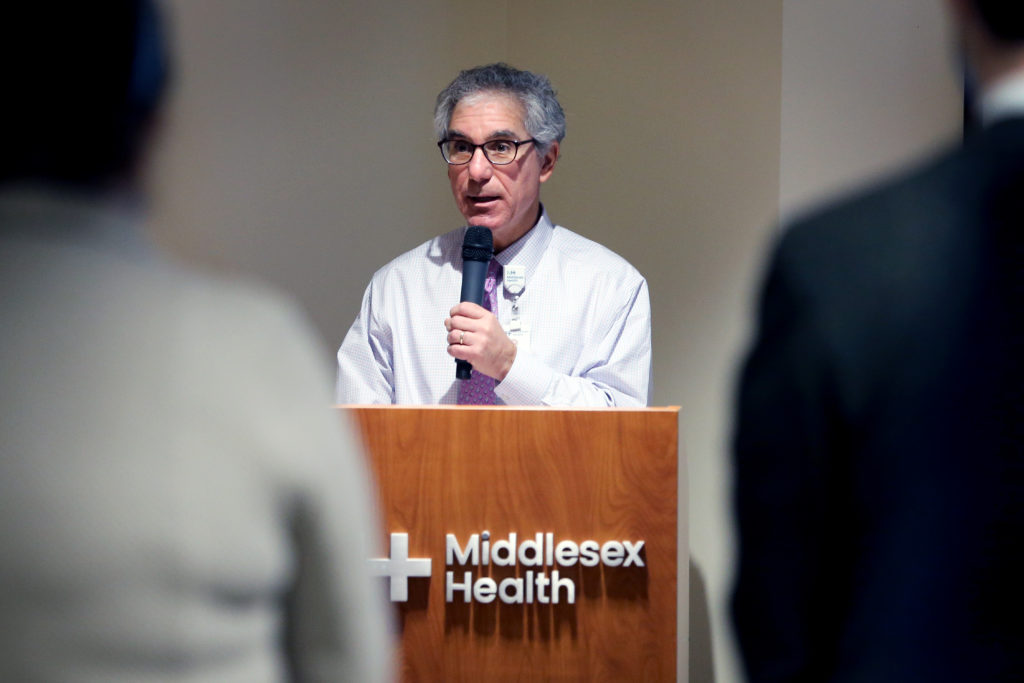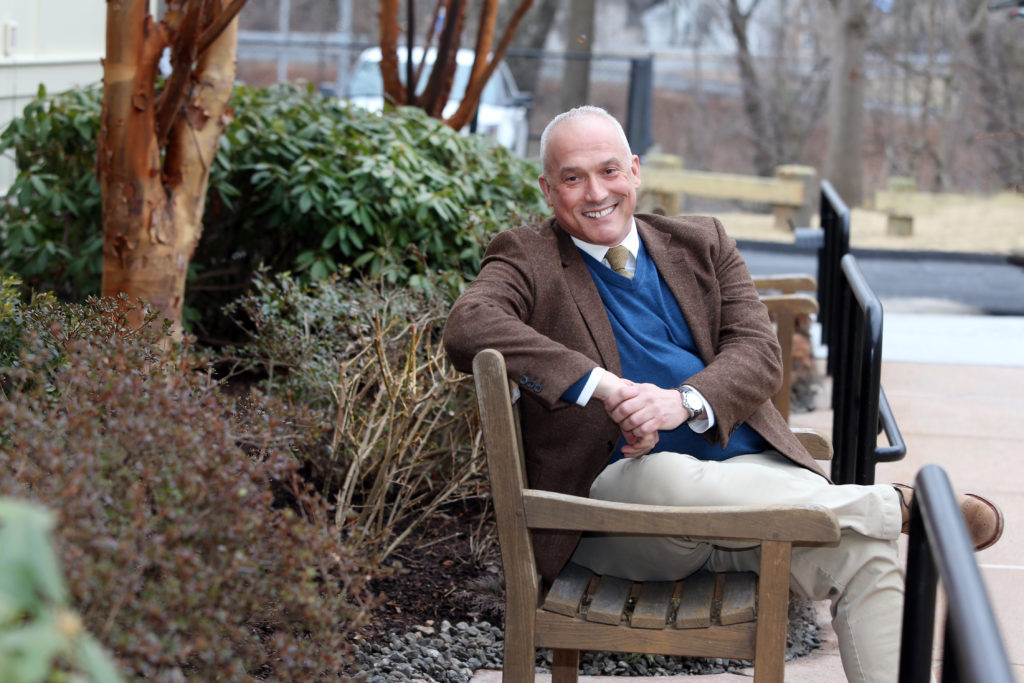By Jane Latus
It isn’t easy being yourself when you’re deemed different, especially if you are directly targeted simply because of who you are. Mental health services are vital to LGBTQ+ health care at Middlesex Health, which has a multidisciplinary Center for Gender Medicine and Wellness and an intentional, system-wide focus on being affirming, supportive and expert providers to LGBTQ+ people. In January, Middlesex opened a new building that consolidates its mental health services for all individuals regardless of how they identify. The Crescent Center houses 108 staff members who were formerly spread among nine buildings.
“There’s nothing inherently pathological about being queer,” says Jeffrey Shelton, MD, chair of psychiatry at Middlesex, “but what is distinct is what people experience. There is an inherent violence to transphobia or homophobia, and it is an incredibly scary thing to be a victim of, and that has an impact on people.” And what an impact: the authors of the National Center for Transgender Equality’s 2015 U.S. Transgender Survey concluded, “The findings paint a troubling picture of the impact of stigma and discrimination on the health of many transgender people. A staggering 39 percent of respondents experienced serious psychological distress in the month prior to completing the survey, compared with only five percent of the U.S. population. Among the starkest findings is that 40 percent of respondents have attempted suicide in their lifetime—nearly nine times the attempted suicide rate in the U.S. population (4.6 percent).” That survey took place before attacks on queer people dramatically ramped up in public schools, legislatures, and the media. Results of the latest survey, completed in December 2022, hadn’t been released at press time.
Discrimination at work or school, in public accommodations, by law enforcement, in housing, and by professional service providers causes stress. So does hateful rhetoric on social media. Add to that the nearly daily news of another state proposing to criminalize being queer. Even in Connecticut, which last year enacted a safe-haven law for refugees from other states’ anti-LGBTQ+ policies, trans residents are targeted. In January, Representative Joe Hoxha (R) introduced a bill “to require public school educators to recognize each student by the biological gender of such student.” Michael Miarecki, LCSW, is the primary mental health clinician for transgender patients at Middlesex. “The negative rhetoric in politics and society in general definitely impacts the mental health of people who identify as LGBT,” he says. He spends a lot of his time helping patients, especially trans people, handle the daily news. “There’s a lot of difficult language on a regular basis,” says Miarecki. “What I want people to hear is that there are a lot of people to support them through their transition or through their LGBT experience. There are therapists out there; there are support networks; there are community-based groups there to help them, whether it’s through Middlesex Health or grassroots organizations.”

Middlesex provides mental health services to nearly 10,000 people of all ages annually. The team includes psychiatrists, psychiatric nurse practitioners, licensed clinical social workers, marriage and family therapists, clinicians who do home visits, and support staff. In every department and every position, Middlesex employees are trained to be informed and respectful to patients of all gender identities and orientations. Staff badges include Pride colors and employee pronouns. Flags welcoming all identities are displayed throughout all buildings.
“These things matter,” says Miarecki. They let patients know they are welcome. “It is an honor to be the person who supports them,” says Miarecki, wiping away a tear. “When you hear a patient say, ‘You’re the first person to believe in me,’ it’s magical.” Shelton agrees. “It’s been such an incredible privilege to work with older trans adults,” he says. He admires how they handle the complexities of coming out at an older age.
MIddlesex offers a wide range of services, including individual therapy, support groups open to the public, therapy groups delineated by age, a navigator to support patients, and a mobile crisis team for young people. Support and therapy for LGBTQ+ individuals, virtually so distance and lack of transportation aren’t obstacles to attending. Telehealth appointments are also available for individual therapy.
It’s scary to be marginalized—or to ask for help. It’s hard to open up to a stranger, says Miarecki, but people who have already been dismissed are even more hesitant. Many are reluctant because they’ve had negative experiences with the medical system. They may have been treated as curiosities, or had their problem overlooked while the therapist fixates on their identity. “Just because someone’s trans doesn’t mean that’s what they need to talk about,” says Shelton. Adds Miarecki, “We look at the whole person.”

The symptoms that stress causes occur at a much higher rate for LGBTQ+ people. Patients commonly have PTSD, anxiety, and depression. Much of the anxiety and depression is situational, says Miarecki. Individuals may lack family or school support and feel isolated. “I can’t tell you the number of trans people I’ve seen who’ve never met another trans person,” says Shelton. “Not having a connection with others is really hard.” Discrimination also leads to joblessness and poverty. Young LGBTQ+ adults make up the majority of unhoused persons nationwide. It’s easy for them to end up in a self-perpetuating cycle. It’s also easier to acquire an addiction, which is Shelton’s practice specialty. A psychiatrist needs to understand these circumstances in order to help patients, he says.
The encouraging news is that studies show that suicidal ideation is reduced by at least half if even one person is supportive. A study reported in the Journal of the American Medicine Association last year reported that suicidal ideation dropped 73 percent for gender nonconforming youths who received affirming care. Support is so powerful a force that a Yale study found it can even counteract a genetic predisposition to depression. “The importance of support in someone’s life, no matter their gender or identity, is so incredibly important,” says Shelton. Providing that support, and helping patients obtain it in all areas of their life, while providing a safe space, is what Middlesex’s clinicians do. Miarecki says people tell him things like, “You’re the first person to hear me and not judge me for being the person I am.”
Through therapy, support groups and casework, clinicians help patients build a network of support. Shelton urges patients to avoid isolation. It’s counterintuitive, but when we are lonely, we tend to further isolate because we feel vulnerable, he says. Different age groups typically face unique issues. For kids, it’s often confronting disbelief from adults who think it’s a phase or experimentation. Kids also face the stress of coming out at school. Young adults struggle with defining their identities, and face issues in work, housing and socializing. 30- and 40-somethings may be coming to terms with difficulties they experienced while younger, since they grew up at a time that lacked societal acceptance and the terminology to define themselves. Older people coming out can feel incredibly liberated but may also feel trauma or regret from having lived unauthentically for most of their lives.








More Stories
A Leader in Care for LGBTQ+ Communities: Meet Kenneth Abriola, MD
Transforming Sexuality: Handling Sexual Changes for Trans Folks
MHC’s “Let’s Face It” Program Expands Mental Health Awareness